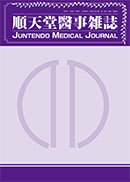Volume 62, Issue 1
Displaying 1-20 of 20 articles from this issue
- |<
- <
- 1
- >
- >|
Contents
-
2016 Volume 62 Issue 1 Pages 1
Published: 2016
Released on J-STAGE: May 11, 2016
Download PDF (2974K)
Health Topics for Tokyoites
-
2016 Volume 62 Issue 1 Pages 2-6
Published: 2016
Released on J-STAGE: May 11, 2016
Download PDF (536K) -
2016 Volume 62 Issue 1 Pages 7-12
Published: 2016
Released on J-STAGE: May 11, 2016
Download PDF (1210K) -
2016 Volume 62 Issue 1 Pages 13-16
Published: 2016
Released on J-STAGE: May 11, 2016
Download PDF (2317K)
Reviews
-
2016 Volume 62 Issue 1 Pages 17-19
Published: 2016
Released on J-STAGE: May 11, 2016
Download PDF (3193K)
Original Articles
-
2016 Volume 62 Issue 1 Pages 20-25
Published: 2016
Released on J-STAGE: May 11, 2016
Download PDF (1588K) -
2016 Volume 62 Issue 1 Pages 26-33
Published: 2016
Released on J-STAGE: May 11, 2016
Download PDF (3830K)
Case Reports
-
2016 Volume 62 Issue 1 Pages 34-36
Published: 2016
Released on J-STAGE: May 11, 2016
Download PDF (1965K) -
2016 Volume 62 Issue 1 Pages 37-41
Published: 2016
Released on J-STAGE: May 11, 2016
Download PDF (1783K)
Reports
-
2016 Volume 62 Issue 1 Pages 42-46
Published: 2016
Released on J-STAGE: May 11, 2016
Download PDF (457K) -
2016 Volume 62 Issue 1 Pages 47-50
Published: 2016
Released on J-STAGE: May 11, 2016
Download PDF (2278K)
Juntendo Research Profiles
-
2016 Volume 62 Issue 1 Pages 51-53
Published: 2016
Released on J-STAGE: May 11, 2016
Download PDF (436K) -
2016 Volume 62 Issue 1 Pages 54-55
Published: 2016
Released on J-STAGE: May 11, 2016
Download PDF (425K) -
2016 Volume 62 Issue 1 Pages 56-57
Published: 2016
Released on J-STAGE: May 11, 2016
Download PDF (3026K) -
2016 Volume 62 Issue 1 Pages 58-59
Published: 2016
Released on J-STAGE: May 11, 2016
Download PDF (2132K) -
2016 Volume 62 Issue 1 Pages 60-61
Published: 2016
Released on J-STAGE: May 11, 2016
Download PDF (2091K) -
2016 Volume 62 Issue 1 Pages 62-63
Published: 2016
Released on J-STAGE: May 11, 2016
Download PDF (9485K)
Publication List
-
2016 Volume 62 Issue 1 Pages 64-78
Published: 2016
Released on J-STAGE: May 11, 2016
Download PDF (550K)
Other articles
-
2016 Volume 62 Issue 1 Pages 79-81
Published: 2016
Released on J-STAGE: May 11, 2016
Download PDF (471K) -
2016 Volume 62 Issue 1 Pages 84-85
Published: 2016
Released on J-STAGE: May 11, 2016
Download PDF (614K)
- |<
- <
- 1
- >
- >|
